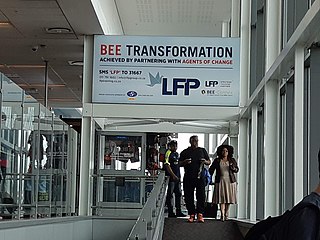Financial capital is any economic resource measured in terms of money used by entrepreneurs and businesses to buy what they need to make their products or to provide their services to the sector of the economy upon which their operation is based. In other words, financial capital is internal retained earnings generated by the entity or funds provided by lenders to businesses in order to purchase real capital equipment or services for producing new goods or services.
Corporate governance are mechanisms, processes and relations by which corporations are controlled and operated ("governed").
Procurement is the process of locating and agreeing to terms and purchasing goods, services, or other works from an external source, often with the use of a tendering or competitive bidding process. The term may also refer to a contractual obligation to "procure", i.e. to "ensure" that something is done. When a government agency buys goods or services through this practice, it is referred to as government procurement or public procurement.

In business and accounting, net income is an entity's income minus cost of goods sold, expenses, depreciation and amortization, interest, and taxes for an accounting period.

A performance indicator or key performance indicator (KPI) is a type of performance measurement. KPIs evaluate the success of an organization or of a particular activity in which it engages. KPIs provide a focus for strategic and operational improvement, create an analytical basis for decision making and help focus attention on what matters most.
Shareholder value is a business term, sometimes phrased as shareholder value maximization. The term expresses the idea that the primary goal for a business is to increase the wealth of its shareholders (owners) by paying dividends and/or causing the company's stock price to increase. It became a prominent idea during the 1980s and 1990s, along with the management principle value-based management or managing for value.
Purchasing is the procurement process a business or organization uses to acquire goods or services to accomplish its goals. Although there are several organizations that attempt to set standards in the purchasing process, processes can vary greatly between organizations.
A privately held company is a company whose shares and related rights or obligations are not offered for public subscription or publicly negotiated in their respective listed markets. Instead, the company's stock is offered, owned, traded or exchanged privately, also known as "over-the-counter". Related terms are unlisted organisation, unquoted company and private equity.

Black Economic Empowerment (BEE) is a policy of the South African government which aims to facilitate broader participation in the economy by black people. A form of affirmative action, it is intended especially to redress the inequalities created by apartheid. The policy provides incentives – especially preferential treatment in government procurement processes – to businesses which contribute to black economic empowerment according to several measurable criteria, including through partial or majority black ownership, hiring black employees, and contracting with black-owned suppliers. The preferential procurement aspect of BEE has been viewed as paradigmatic of a sustainable procurement approach, whereby government procurement is used to advance social policy objectives. So-called "BEE deals" – transactions aiming to increase black ownership of large businesses – have been conducted on a large scale, with BEE transactions concluded between 1994 and 2005 valued at between R150 billion and R285 billion.
In management, business value is an informal term that includes all forms of value that determine the health and well-being of the firm in the long run. Business value expands concept of value of the firm beyond economic value to include other forms of value such as employee value, customer value, supplier value, channel partner value, alliance partner value, managerial value, and societal value. Many of these forms of value are not directly measured in monetary terms. According to the Project Management Institute, business value is the "net quantifiable benefit derived from a business endeavor that may be tangible, intangible, or both."

In company financial reporting in the United States, comprehensive income "includes all changes in equity during a period except those resulting from investments by owners and distributions to owners". Because that use excludes the effects of changing ownership interest, an economic measure of comprehensive income is necessary for financial analysis from the shareholders' point of view.
Stock dilution, also known as equity dilution, is the decrease in existing shareholders' ownership percentage of a company as a result of the company issuing new equity. New equity increases the total shares outstanding which has a dilutive effect on the ownership percentage of existing shareholders. This increase in the number of shares outstanding can result from a primary market offering, employees exercising stock options, or by issuance or conversion of convertible bonds, preferred shares or warrants into stock. This dilution can shift fundamental positions of the stock such as ownership percentage, voting control, earnings per share, and the value of individual shares.

In international trade, market access refers to a company's ability to enter a foreign market by selling its goods and services in another country. Market access is not the same as free trade, because market access is normally subject to conditions or requirements, whereas under ideal free trade conditions goods and services can circulate across borders without any barriers to trade. Expanding market access is therefore often a more achievable goal of trade negotiations than achieving free trade.
Supplier diversity refers to the use of minority-owned businesses as suppliers, and a supplier diversity program is a proactive business program which encourages such use within an organisation's supply chain. Minority-owned includes black and minority ethnic business ownership, women owned, veteran owned, LGBT-owned, service disabled veteran owned, historically underutilized business, and Small Business Administration (SBA)-defined small business concerns. The Hackett Group refers to "approximately 16 categories" covering various aspects of supplier diversity. It is not directly correlated with supply chain diversification, although utilizing more vendors may enhance supply chain diversification. Supplier diversity programs recognize that sourcing products and services from previously under-used suppliers helps to sustain and progressively transform a company's supply chain, thus quantitatively reflecting the demographics of the community in which it operates by recording transactions with diverse suppliers.
Sustainable procurement or green procurement is a process whereby organizations meet their needs for goods, services, works and utilities in a way that achieves value for money on a life-cycle basis while addressing equity principles for sustainable development, therefore benefiting societies and the environment across time and geographies. Procurement is often conducted via a tendering or competitive bidding process. The process is used to ensure the buyer receives goods, services or works for the best possible price, when aspects such as quality, quantity, time, and location are compared. Procurement is considered sustainable when organizations broadens this framework by meeting their needs for goods, services, works, and utilities in a way that achieves value for money and promotes positive outcomes not only for the organization itself but for the economy, environment, and society.
In South African law, Exempted Micro Enterprises (EMEs) are businesses that are exempt from measurement in terms of the DTI's codes of Good Practice for Black Economic Empowerment (BEE). They automatically qualify as 100% contributors towards BEE, this offers small South African businesses the opportunity to grow as a result of BEE irrespective of the make-up of the shareholding.

Coronation Fund Managers is a South African third-party fund management company, headquartered in Cape Town. The company has locations in all South African major centers and offices in, Ireland, United Kingdom and in Namibia where it is represented by Namibia Asset Management a strategic partner. As of December 2019 the company had Assets under management of R578 billion.

Corporate finance is the area of finance that deals with the sources of funding, and the capital structure of businesses, the actions that managers take to increase the value of the firm to the shareholders, and the tools and analysis used to allocate financial resources. The primary goal of corporate finance is to maximize or increase shareholder value.
A capitalization table or cap table is a table providing an analysis of a company's percentages of ownership, equity dilution, and value of equity in each round of investment by founders, investors, and other owners.
Social ownership is a type of property where an asset is recognized to be in the possession of society as a whole rather than individual members or groups within it. Social ownership of the means of production is the defining characteristic of a socialist economy, and can take the form of community ownership, state ownership, common ownership, employee ownership, cooperative ownership, and citizen ownership of equity. Within the context of socialist economics it refers particularly to the appropriation of the surplus product produced by the means of production to society at large or the workers themselves. Traditionally, social ownership implied that capital and factor markets would cease to exist under the assumption that market exchanges within the production process would be made redundant if capital goods were owned and integrated by a single entity or network of entities representing society. However, the articulation of models of market socialism where factor markets are utilized for allocating capital goods between socially owned enterprises broadened the definition to include autonomous entities within a market economy.






